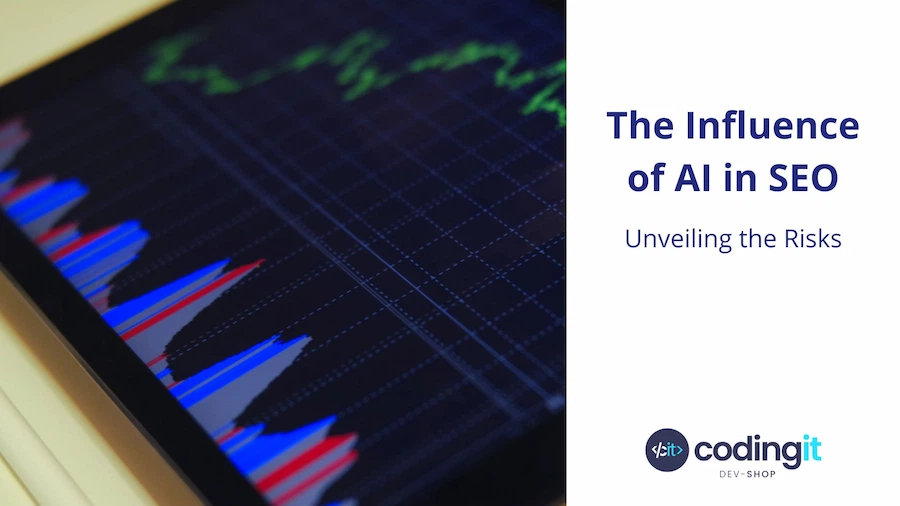Artificial Intelligence (AI) has become a very useful tool in modern Marketing teams, specially in Search Engine Optimization (SEO) strategies. By using Machine Learning algorithms and natural language processing that learn from data and understand human language, AI helps businesses improve their online visibility and attract more visitors to their websites. It does this by analyzing how and what people search for on the internet and predicting their behavior. This allows businesses to fine-tune their SEO efforts to better match what users are looking for.
AI is behind many tools in SEO, like generating content, making personalized recommendations, and predicting future trends. These tools can be very helpful, processing huge amounts of information quickly, allowing marketers to spot new opportunities, adapting to changes in how people search (like using voice commands), and targeting specific groups of users more effectively. By taking care of the routine tasks, AI also gives SEO experts more time to focus on coming up with creative ideas and strategies.
While AI undeniably offers invaluable assistance in marketing, it’s important to recognize that its implementation comes with complexities and considerations beyond its benefits. Despite the promise of its processing capabilities, leveraging AI effectively in SEO requires a nuanced understanding and careful management. Successful integration demands more than just deploying AI writing tools. Although AI-driven solutions can automate repetitive tasks and uncover insights from vast datasets, they don’t replace human expertise and intuition. We must strike a balance between AI automation and human creativity, ensuring that optimization strategies remain authentic, relevant, and resonant with target audiences.
- Challenges Associated with Using AI in SEO
- Excessive Dependence on AI Automation
- Potential Algorithmic Biases in Search Results
- Threats to User Data Privacy
- Exploitation of Search Algorithms
- Is it Ethical to Use AI in SEO?
- Adapting to Changes in AI
Challenges Associated with Using AI in SEO
The loss of human control over the SEO strategy due to the integration of AI has raised some eyebrows, with concerns about the loss of human touch in marketing decisions.
Traditionally, experts have been the creative brains behind interpreting data, understanding what moves audiences, keyword research, and making savvy choices. However, as AI algorithms increasingly dictate content creation, keyword selection, and link building, there’s a concern that human input might take a back seat. This can result in a gap between brands and their audiences, as optimization strategies may lack the personalization and authenticity that humans bring to the table.
Yes, AI is a whiz at crunching numbers and spotting patterns, but it might miss the mark on picking up the finer points of human emotions, cultural vibes, and shifting market trends. This means there’s a risk of ending up with AI generated content that feels a bit too formulaic and repetitive, lacking that special something that really connects with people.
Excessive Dependence on AI Automation
The appeal of using AI for automation can be tempting. It can be very helpful, there is no doubt in that, but relying too much on automated solutions comes with risks. The idea of letting algorithms handle everything can lead to a flood of generic AI content for SEO that lacks personality and ignores smaller, specialized markets. Algorithms are great at spotting popular trends that appeal to a wide audience, but they often miss the finer details of niche or new trends. Moreover, when search results are turned into products to be bought and sold, it encourages clickbait and sensationalism. This can make online information less reliable.
What’s more, relying too heavily on AI might squash creativity. Instead of coming up with fresh ideas, SEO specialists might focus too much on efficiency and end up with content that feels robotic and doesn’t stand out. This could mean losing the unique identity of a brand and making it harder for consumers to trust it. Plus, AI technology is always changing, which means we must keep up with updates and rules about how data is used, adding a new layer of complexity to an already tricky situation.

Potential Algorithmic Biases in Search Results
Though powerful, AI algorithms can (and will) pick up biases from the data they learn from. If the data used to teach them is partial, the algorithms might end up making predisposed decisions too. Biased data can lead to unfair results, like reinforcing stereotypes or treating certain groups unfairly. For instance, if an algorithm learns mainly from historical data that focuses on one group, it might favor that group’s perspective and marginalize minority perspectives or even ignore them.
One big problem in dealing with these favoritisms is that algorithms often don’t explain why they make certain choices. In fact, many just trust the judgment of the system they are utilizing without much of a second thought. This lack of transparency makes it hard to spot and fix biases, especially if you are not in control of the training data or temperature of responses. The result ends up being that existing inequalities get even worse, especially in sensitive areas like hiring, finance, and healthcare, where AI is increasingly applied to make decisions faster nowadays.
To tackle these injustices, especially in SEO and other fields, we need to take active steps. This means making sure the data used to train algorithms is diverse and inclusive, using tools to find and fix biases, and collaborating across different fields to address bigger issues of unfairness. By doing this, we can make AI systems a little bit fairer and more helpful for everyone.
Exploitation of Search Algorithms
The rise of AI SEO tools has made the proliferation of sophisticated spam tactics easier, as nefarious actors become more skilled at exploiting vulnerabilities in search algorithms to manipulate rankings and deceive users. Besides traditional methods like keyword stuffing and link farming, spammers now use AI to generate more convincing and targeted content, making it increasingly difficult for search engines to distinguish between resourceful content that is meant for users and content that is simply designed to capture clicks.
Because these tricks are automated, spammers can flood search results with lots of low-quality or misleading stuff really quickly. This not only hurts the credibility of honest businesses but also makes users lose trust in search engine results, which can make them feel frustrated and disengaged.
But there’s hope! People are starting to realize that AI can also help fight spam. By adapting technologies to develop more specific spam detection mechanisms, search engines can better protect users from being fooled and try to keep the internet a safer place.
Is it Ethical to Use AI in SEO?
The use of AI in SEO content creation brings up important ethical questions that need to be looked at carefully. While AI tools make things more efficient and scalable, they also make us think about issues like honesty, openness, and how much users can trust what they see online. Since AI SEO tools create text based on patterns in existing data, there’s a chance the content won’t have that human touch or creativity. This makes us wonder if the content can really connect with people in a genuine way.
Another concern regarding AI vs human creation is that the generated content might not be very clear to users. If people can’t tell if content was made by AI or by humans, it makes it hard for them to trust what they’re reading online. This lack of transparency could also lead to confusion or trickery, as people might not know where the content is coming from or if it’s reliable.
Plus, there’s the issue of using AI to boost search engine rankings. While it can help make content more visible online, it also brings up questions of fairness and equality. If AI algorithms favor certain content over others based on biased data, it could mean some voices aren’t heard.

Threats to User Data Privacy
With the widespread use of AI to personalize search results and a focus on targeted ads, there’s a bigger chance that user data could be at risk. As it gathers and analyzes lots of personal info, worries about data leaks and unauthorized access grow.
Furthermore, major tech companies collecting lots of user data raises concerns about personal information being used for profit and privacy rights being ignored. Without enough rules and protections in place, using AI recklessly could seriously threaten user privacy and autonomy.
To tackle these problems, us in the SEO industry need to take a smart approach that includes technological innovation, regulatory compliance, and ethical practices. This means using new tech to protect privacy, being clear about how data is collected and used, and giving users more control over their data through robust consent mechanisms.
On top of that, pushing for rules that put users first can help build trust and responsibility in the online world. By focusing on user privacy and security, we can reduce some of the alarms associated with AI.
Adapting to Changes in AI
The way AI constantly change makes things tough for SEO experts. Unexpected updates and tweaks to algorithms can completely mess up the strategies we have been using and make search rankings drop suddenly. While search engines try to improve their results and stop people from cheating the system, it is likely that they won’t tell us what changes they’ve made. This means we must quickly figure out what’s new and adjust the tactics.
As a result, brands can lose customers and sales if they don’t keep up with these changes. This shows how important it is for marketing experts to be flexible and tough in their SEO efforts. To handle these challenges, we need to keep an eye out for changes in algorithms, stay updated on what’s happening in the industry, and always be ready to try new things. By being open to change and staying on top of things, SEO strategies could stay effective for longer periods of time and competitive in this fast-changing world.
At Coding IT, we understand the challenges that come with navigating this scene. We offer comprehensive SEO services tailored to your specific needs, helping your business adapt to changes in AI and stay ahead of the competition by remaining visible and competitive in search engine rankings. Contact us and learn more about how we can help improve your business’s online visibility and drive organic traffic to your website.
